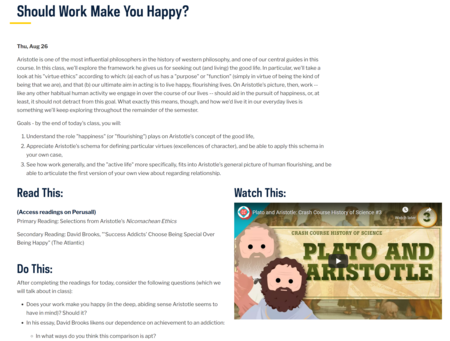Policies & Assignments
Course Learning Goals
This course is meant to help you learn about the ways that philosophers conceptualize work, and introduce you to some of the major issues and debates they consider, so that you can be more intentional and reflective about your own relationship to work. There are three big picture goals that will provide the overarching structure of our efforts. By the end of this course, you will...
|
1: Know more about the philosophy of work. |
|
You will understand some of the most relevant frameworks philosophers have used to think about what work is, and what role it should play in our lives. And you will build a theoretical toolkit of philosophical concepts and theories that can help you make sense of the most pressing practical issues that arise in connection with work, in order to make thinking about these issues more tractable and concrete in your own experience. For example, you’ll understand why virtue ethicists look at work from the point of view of human flourishing, why many have characterized it as an essential good, and what role community and friendship plays in a fulfilling working life. You’ll understand how some utilitarians (like effective altruists) think about generosity, and how radical their conception of this virtue really is. |
|
2: Reflectively construct your own “philosophy of work.” |
|
A "philosophy of work" (as I'm thinking about it) is an account of how you think about the nature, value, and meaning of work, and how you think these things should integrate into a flourishing "work life." In this document, you will articulate the role you think meaning, purpose, passion, and impact should play in your working life. You will think seriously about where meaning comes from in life, and about how to find meaningful work; identify your passions, values, and strengths and think about how to align your work with each of these. You’ll define purpose and impact, and come up with a view on how all of these things relate to each other, and how you want to balance them in your working life. You’ll also look at research (some of it empirical) about happiness, joy, pleasure, and satisfaction, and will formulate your own hypotheses about how to realize these in your own work. |
|
3: Create a plan based on your own philosophy of work, and perform practical life experiments aimed at testing out its major hypotheses. |
|
Over the course of the semester, you will identify practices or habits you think are associated with effective meaning making (or the search for meaning) in work, and implementing these in an experimental way. You will reflect on and engage in dialogue about your past and current working experiences in order to further refine your philosophy of work. You’ll identify mentors or exemplars who exhibit the most important virtues in the working life, and figure out how to engage or learn from their lives. You’ll also reflect on major obstacles or challenges in the working life, and cultivate resources for dealing with anxiety, disappointments, setbacks, adaptation and the less pleasant aspects of having a job. Finally, you’ll connect up the work we do together in this course with your current working life, i.e. your school work and education broadly construed, your career planning and job search, and opportunities you’re seeking outside of the classroom to more actively discern your vocation. |
Feedback & Assessment

Your work in this course will fall into one of three categories:
- Participation and Engagement
- Dialogue / group work
- Individual written work and demonstrated mastery of course concepts
Here's how each of these categories will break down more concretely.
Participation and Engagement
Before coming to class, I'll expect you to do a bit of "pre-work." This is outlined on the course page for any given day, which you can find by clicking over to the "Course Calendar" via the main navigation bar above. On most normal course days, this work will consist in the following:

- Looking over the summary and learning goals for that particular day, and recalling anything we talked about in our previous class pertaining to the content you'll be reading.
- Reading a "primary text," usually written by a philosopher, some contemporary, some long dead. You'll do this on an annotation platform called "Perusall," which you can access by loggin onto "Canvas" and clicking through the "Perusall" link. A couple of notes:
- I'll ask you to annotate the texts on Perusall as you go with questions or comments you might have (especially those that pertain to a particular lesson's content). Perusall will automatically encourage you to engage (giving you points for questions asked, comments left, and for engaging the text in various other ways.
- You'll be automatically sorted into small groups on Perusall, and members of this small group will be able to see and comment on your annotations. I will also be able to see your questions and annotations, and I'll use this information in preparing for our group discussions and activities.
- Reading a "secondary reading" (which I'll sometimes accidentally refer to as "application articles"), also on Perusall. These secondary readings come from contemporary venues like the New York Times, The Atlantic, or the Harvard Business Review. I've carefully selected them because I think they engage (or perhaps dispute) the central claims of the philosopher you'll be reading for that particular day.
- Watching a short (3-10 minute) embedded video that helps contextualize and explain that day's content.
- And reflecting on a couple discussion questions prior to attending class. You do not need to answer these questions in any particular format, and I won't collect them. But I'll be using these questions as a jumping off point in class discussions, and this will count toward your overall participation in the course.
You'll receive automatic feedback from Perusall in the form of a score (between 1-10) for each reading. Each Wednesday I'll give you a chance to demonstrate mastery of that week's content by answering a few comprehension questions. These questions might be multiple choice, true or false, or open-ended. These questions will be designed to see whether you've achieved the learning goals for each class, and many will relate to the discussion questions I've posted. So paying close attention to those as you prepare for class will help ensure you're prepared for these weekly checks. Sometimes, throughout the semester, I'll give you a chance to reflect on your participation in class, and to set personal participation goals.
Dialogue / Group Work
During our first unit, we will be focusing on developing skills in philosophical discussion and dialogue. We'll spend a few class periods defining and practicing these, but as a preview here's how we'll be thinking about the distinction:
|
|
|
|
|
|
|
|
|
|
|
|
After this unit, you'll be organized into a small group that you'll be meeting with throughout the remainder of the semester. This group will engage in dialogue, and will complete one of the course's major assignments together.
Individual (Written) Work
The capstone assignment in this course will be a short document (roughly 5 - 8 pages) that outlines: (1) your own philosophy of work (drawing on, and developing the theories we will be examining), and (2) a concrete plan to put that plan into practice in your career exploration over the next 3 to 5 to 10 years. Along the way, you'll be completing smaller parts of this assignment (e.g. turning in an outline, reflecting on particular philosophers, etc) and will receive personalized feedback from me on this work.
Drafting and then writing this capstone assignment (along with the meetings and feedback in between) will count for roughly 1/3 of your final grade.
Major Assignments
All information about major assignments (including assignment descriptions, rubrics, and their deadlines) can be accessed via your section's Canvas page.
Other Important Policies
Communication
I'll be communicating frequently. Mostly via email, but I'm also available to talk in person. Feel free to email me anytime, or schedule a time to come talk -- during my office hours (see "The Team" page for more on that), or whenever. It's very important that you communicate, especially if you anticipate missing a class period, become sick, or need some other accommodation.
Accommodations
All accommodations must go through the Sara Bea Center. At this point, I do not plan to administer any written exams (though I may, depending on whether this kind of assessment seems warranted). In general, I'm much more interested in demonstrated mastery of skills and content related to the course than in any kind of high-pressure performance, and I design assessment accordingly. But if you have any concerns at all, I'm very happy to talk through types of assessment you might encounter in the class, and I'm always happy to work directly with you, and / or with representatives from the Sara Bea Center, as my number one goal is for you to thrive and flourish in this course!
Late Work
I reserve the right not to accept late work, and will assess requests for extensions on a case-by-case basis, taking into account individual circumstances, whether the extension is requested in advance (to the extent possible), and whether you have an official university excuse. If you receive an excused absence for a day on which credit is given for an in-class activity or assessment, you'll be expected to make up that activity as soon as possible. You should contact me with the official excuse and make arrangements as it's appropriate.
Honor Code
I don't anticipate many issues arising in connection with the honor code (in part because I'm not asking you to do very many things that could be done by anyone other than you), but, per the university's recommendation, here's a blurb about the honor code (which I do take very seriously).
This class follows Notre Dame’s binding Honor Code. All work you submit must be your own. Your sources must be properly cited. In general, you can just reference course readings by their book or article title. Outside readings should be cited with a works cited or footnote system. Direct quotations from others must be in quotation marks. If you have questions about how to attribute your sources, talk to me.
Student Mental Health
Care and Wellness Consultants provide support and resources to students who are experiencing stressful or difficult situations that may be interfering with academic progress. Through Care and Wellness Consultants, students can be referred to The University Counseling Center (for cost-free and confidential psychological and psychiatric services from licensed professionals), University Health Services (which provides primary care, psychiatric services, case management, and a pharmacy), and The McDonald Center for Student Well Being (for problems with sleep, stress, and substance use). Visit mcwell.nd.edu.